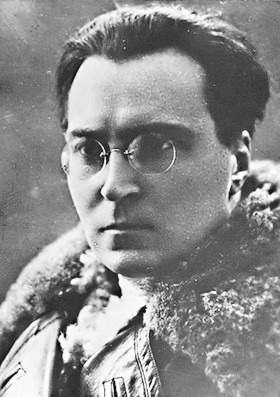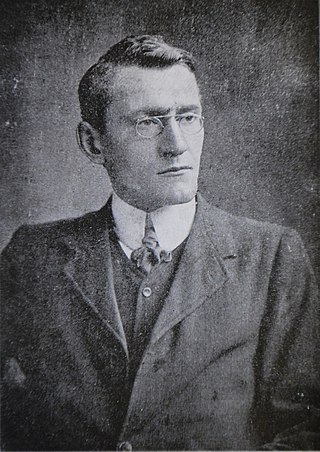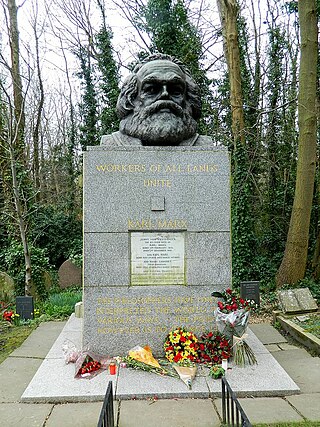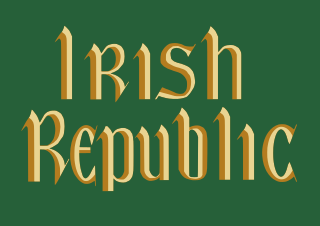
Lev Davidovich Bronstein, better known as Leon Trotsky, was a Russian revolutionary, Soviet politician, journalist, and political theorist. He was a central figure in the October Revolution, Russian Civil War, and the establishment of the Soviet Union. Ideologically a Marxist and a Leninist, Trotsky's thought and writings inspired a school of Marxism known as Trotskyism.

Trotskyism is the political ideology and branch of Marxism developed by Russian revolutionary Leon Trotsky and some other members of the Left Opposition and Fourth International. Trotsky described himself as an orthodox Marxist, a revolutionary Marxist, and a Bolshevik–Leninist as well as a follower of Marx, Engels, Vladimir Lenin, Karl Liebknecht, and Rosa Luxemburg. He supported founding a vanguard party of the proletariat, proletarian internationalism, and a dictatorship of the proletariat based on working-class self-emancipation and council democracy. Trotsky also adhered to scientific socialism and viewed this as a conscious expression of historical processes. Trotskyists are critical of Stalinism as they oppose Joseph Stalin's theory of socialism in one country in favour of Trotsky's theory of permanent revolution. Trotskyists criticize the bureaucracy and anti-democratic current developed in the Soviet Union under Stalin.

Nadezhda Konstantinovna Krupskaya was a Russian revolutionary and the wife of Vladimir Lenin.

George Noble Plunkett was an Irish nationalist politician, museum director and biographer, who served as Minister for Fine Arts from 1921 to 1922, Minister for Foreign Affairs from 1919 to 1921 and Ceann Comhairle of Dáil Éireann in January 1919. He served as a Teachta Dála (TD) from 1918 to 1927. He was a Member of Parliament (MP) for Roscommon North from 1917 to 1922.

Victor Serge, born Victor Lvovich Kibalchich, was a Russian revolutionary Marxist, novelist, poet and historian. Originally an anarchist, he joined the Bolsheviks five months after arriving in Petrograd in January 1919 and later worked for the Comintern as a journalist, editor and translator. He was critical of the Stalinist regime and remained a revolutionary Marxist until his death. He is best remembered for his Memoirs of a Revolutionary and series of seven "witness-novels" chronicling the lives of Soviet people and revolutionaries and of the first half of the 20th century.

Ivan Nikitich Smirnov was a Russian Bolshevik revolutionary, Soviet politician and Communist Party functionary. A prominent member of the Left Opposition, he led a secret trotskyist opposition group in the Soviet Union during the Stalin period. He was arrested in 1933 and shot during the Great Purge.
People's Democracy was a political organisation that arose from the Northern Ireland civil rights movement. It held that civil rights could be achieved only by the establishment of a socialist republic for all of Ireland. It demanded more radical reforms of the government of Northern Ireland than the Northern Ireland Civil Rights Association.
The Limerick Soviet was one of a number of self-declared Irish soviets that were formed around Ireland circa 1919. The Limerick Soviet existed for a two-week period from 14 to 27 April 1919. At the beginning of the Irish War of Independence, a general strike was organised by the Limerick Trades and Labour Council, as a protest against the British Army's declaration of a "Special Military Area" under the Defence of the Realm Act, which covered most of Limerick city and a part of the county. The soviet ran the city for the period, printed its own money and organised the supply of food. The Limerick Soviet was one of a number of Irish soviets declared between 1919 and 1923.

Revolutionary Marxist Group was a Trotskyist organisation in Ireland during the 1970s.

The Irish Worker League was an Irish communist party, established in September 1923 by Jim Larkin, following his return to Ireland. Larkin re-established the newspaper The Irish Worker. The Irish Worker League (IWL) superseded the first Communist Party of Ireland and became Ireland's affiliate with the Communist International.

Richard Francis Hayes was an Irish politician, historian and medical doctor. He was a volunteer and fought in the Easter Rising in 1916 and was involved in the Garristown and Ashbourne fighting.
The International Marxist Group (IMG) was a Trotskyist group in Britain between 1968 and 1982. It was the British Section of the Fourth International. It had around 1,000 members and supporters in the late 1970s. In 1980, it had 682 members; by 1982, when it changed its name to the Socialist League, membership had fallen to 534.
Revolutionary terror, also referred to as revolutionary terrorism or a reign of terror, refers to the institutionalized application of force to counterrevolutionaries, particularly during the French Revolution from the years 1793 to 1795. The term "Communist terrorism" has also been used to describe the revolutionary terror, from the Red Terror in the Russian Soviet Federative Socialist Republic (RSFSR) to the reign of the Khmer Rouge and others. In contrast, "reactionary terror", such as White Terror, has been used to subdue revolutions.
Revolutionary socialism is a political philosophy, doctrine, and tradition within socialism that stresses the idea that a social revolution is necessary to bring about structural changes in society. More specifically, it is the view that revolution is a necessary precondition for transitioning from a capitalist to a socialist mode of production. Revolution is not necessarily defined as a violent insurrection; it is defined as a seizure of political power by mass movements of the working class so that the state is directly controlled or abolished by the working class as opposed to the capitalist class and its interests.
The Irish Marxist Society was a Eurocommunist organisation active in Ireland in the 1970s.
Revolutionary Workers' Groups (RWG) were left wing groups in Ireland officially founded in 1930 with the objective of creating a Revolutionary Workers' Party. Formed initially as the Preparatory Committee for the Formation of a Workers’ Revolutionary Party, it changed its name in November 1930. It was helped to be established by Bob Stewart and Tom Bell from the Communist Party of Great Britain and Comintern. In 1933 they disbanded and established the Communist Party of Ireland. By 1935 Tommy Geehan was a leading member of the party.

Far-left politics in the United Kingdom have existed since at least the 1840s, with the formation of various organisations following ideologies such as Marxism, revolutionary socialism, communism, anarchism and syndicalism.

The Irish soviets were a series of self-declared soviets that formed in Ireland during the revolutionary period of the Irish War of Independence and the Irish Civil War, mainly in the province of Munster. "Soviet" in this context refers to a council of workers who control their place of work, not a Soviet state.
The Bloc of Oppositions, also known as Trotsky's bloc and called by the Soviet press the Bloc of Rights and Trotskyites, was a political alliance created by oppositionists in the USSR and Leon Trotsky by the end of 1932. Trotsky defined it as a conspiratorial bloc in order to fight Stalinist repression in the Soviet Union.

Peter Graham was an Irish republican and Marxist who worked as an electrician.












